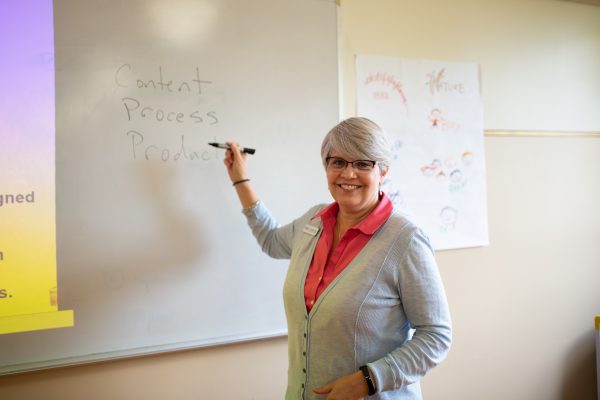Grace College School of Education program completers* effectively contribute to the learning growth of P-12 students. This learning growth is demonstrated through the School of Education’s Action Research Project. Further, Grace completers are able to apply within P-12 classrooms the professional knowledge, skills and dispositions that the preparation experiences were designed to achieve as demonstrated through Indiana’s Teacher Surveys.
*The term “completer” within the context of Impact Data refers to a candidate who successfully satisfied all program requirements of a preparation program at least six months previously and who is employed in a position for which they were prepared for state licensure.
MEASURE 1a: COMPLETER IMPACT CONTRIBUTING TO P-12 STUDENT-LEARNING GROWTH
ACTION RESEARCH PROJECT:
Gathering student impact data has been a challenge for Indiana Educator Preparation Programs (EPPs). Given the state of Indiana does not provide to EPPs the student test data connected to specific teachers, it falls on the EPP to generate meaningful data in order to demonstrate the effectiveness of individual completers’ instruction on P-12 student learning and development. In response to this need for impact data, the EPP developed an action research project in which program completers who are in their first, second or third year of in-service teaching would complete a Professional Teacher Work Sample (PTWS). The PTWS Project is based on a modified version of the undergraduate Teacher Work Sample project and is executed annually by a new cohort of professional teachers (program completers) at differing grade levels, school districts, and content areas. The PTWS is then presented to the cadre of participants as well as School of Education faculty and student-growth data is highlighted. The assessment employs a range of strategies, and professional teachers provide credible evidence of their ability to facilitate learning-growth for all students.
In the PTWS, participating teachers employ a range of strategies and build on each student’s strengths, needs, and prior experiences. Participants provide evidence of their ability to facilitate learning and document student progress throughout a unit of study aligned to state standards. PTWS participants systematically plan, document and analyze student learning, and reflect on practice to produce student-learning growth.
A sample of 15 completers were evaluated over the course of three applications of the PTWS. Data for spring 2022 (n=5), spring 2023 (n=4), and fall 2024 (n=6) participants demonstrate that professional teachers who have been prepared by Grace School of Education have the knowledge and skills to improve student-learning growth. Across all applications, completers’ ability to link contextual factors and research-based strategies to produce significant student-learning growth is illustrated by all participants scoring at or above target in all categories.
(See link to PTWS Assessment and data for more information)
MEASURE 1b: COMPLETER EFFECTIVENESS IN APPLYING PROFESSIONAL KNOWLEDGE, SKILLS, AND DISPOSITIONS
TEACHER SURVEY:
The Indiana Teacher Survey addresses Knowledge Preparation, Pedagogical Preparation, and Professional Disposition of first- and second-year in-service Initial Practitioners (similar to the Principal Survey of New Teachers). The survey consists of 21 elements that reflect both national professional standards (Council for the Accreditation of Educator Preparation) and model standards for beginning teacher licensing and the Interstate New Teacher Assessment and Support Consortium (INTASC). The Teacher Survey is an opportunity for teachers to assess the quality of instruction by their Indiana teacher preparation program.
Teachers respond to 21 items regarding how well the new teacher was prepared for service by selecting one of the following four statements: Strongly Disagree, Disagree, Agree or Strongly Agree. Teachers are also asked to give an Overall Assessment rating of how well they were prepared to teach by the EPP by selecting either “Poor”, “Fair”, “Good”, or “Excellent.” Results are as follows:
2024 TEACHER SURVEY:
The data reflects positive feedback from teachers about their educator preparation programs, with most respondents expressing strong agreement that they were well-prepared across various areas.
Knowledge Preparation:
- A significant majority felt well-prepared to understand learner development, meet content knowledge expectations, adhere to ethical standards, and recognize the importance of professional growth.
- Teachers were also well-prepared to meet legal requirements, though a small number showed some uncertainty.
Pedagogical Preparation:
- Teachers were highly confident in their ability to provide challenging and inclusive learning experiences, create rigorous environments, and collaborate effectively with colleagues.
- A strong majority felt prepared to differentiate instruction, work with students of all exceptionalities, develop quality assessments, analyze student data, manage classrooms, and integrate technology.
Professional Disposition Preparation:
- Teachers overwhelmingly agreed that they were prepared to accept feedback, exhibit ethical practices, collaborate with other professionals, work with parents, and navigate school culture.
- They also felt well-equipped to work with school leaders and effectively contribute to a positive school environment.
Overall Assessment:
- The overall assessment was highly positive, with most teachers rating their preparation as excellent, highlighting the effectiveness of their programs.
In conclusion, teachers reported feeling exceptionally well-prepared across all areas of their educator preparation programs, with particular strengths in ethical practices, collaboration, and pedagogical strategies. While a few areas, such as legal requirements and some content preparation, showed room for improvement, the general sentiment was overwhelmingly positive.
2023 TEACHER SURVEY:
Due to fewer than 10 Grace completers being assessed in the 2023 Teacher Survey, no Teacher Survey data was included in the 2023 report.
2022 TEACHER SURVEY
Knowledge Preparation:
- Graduates felt very well-prepared in understanding student development, meeting content expectations, adhering to ethical and legal requirements, and recognizing the importance of ongoing professional development, with most strongly agreeing (7-10 responses in the “Strongly Agree” category).
Performance Preparation:
- Graduates felt confident in providing challenging, inclusive, and rigorous learning experiences, working collaboratively with colleagues, differentiating instruction, and effectively working with students of all exceptionalities. Strong agreement was especially noted in areas like differentiating instruction and using technology.
Professional Disposition:
- Graduates strongly agreed they were prepared to accept feedback, exhibit ethical practices, collaborate with other professionals, and work effectively with parents and school leaders. They also felt prepared to work within the school culture, with a particularly high agreement on collaboration with colleagues and school leaders.
Overall Assessment:
- The overall assessment of the program was overwhelmingly positive, with most graduates rating their preparation as excellent (9 out of 11).
In conclusion, graduates of the Teacher Educator Preparation Program at Grace College reported a strong sense of preparedness across all areas, especially in knowledge, performance, and professional disposition, with the majority giving an excellent overall rating.
Link to PTWS
Link to 2022 Teacher Survey
Link to 2024 Teacher Survey




